6560/6561 related oscilloscope and vectorscope images
Posted: Tue Jun 14, 2016 11:59 am
by lance.ewing
I've created this topic as a place for discussions related to oscilloscope and vectorscope analysis of the 6560 and 6561 chips. In a separate thread, eslapion posted some oscilloscope images and said:
eslapion wrote:Anything else you'd like to see?
I created this topic to further that discussion.
To kick things off with a luminance/sync specific request, I'd like to request that all 16 colours are placed side by side as coloured spaces on a black background, using the same approach as was used in the following:
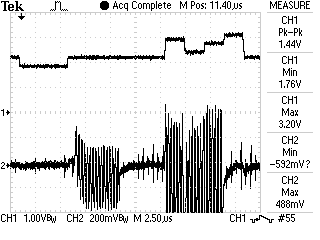
- full_section.png (3.29 KiB) Viewed 4812 times
...and that the vertical scale for the luminance/sync channel be stretched such that the gaps between the luminance levels are larger. Start by doing it in the normal VIC 20 colour order. After doing that, do the same but in the order of assumed increasing luminance (obviously there are some that we think share the same luminance level, but I'm wanting to see to what degree the level is the same when we see them side by side).
Re: 6560/6561 related oscilloscope and vectorscope images
Posted: Tue Jun 14, 2016 12:21 pm
by Tom
Carrying over from the previous thread, from eyeballing the previous graph in which the VIC's approximation of a sine curve for the colour subcarrier was measured, I got the individual vertical bars as being placed and sized as:
Centres: 63, 63, 60.5, 58.5, 57.5, 57, 56.5, 56, 54.5, 53, 51, 48.5, 44.5, 40, 38, 36, 36, 34.5, 34.5, 32, 28.5, 25, 21.5, 19.5, 19, 18, 16.5, 15, 13, 9.5, 6, 4.5, 3, 3.5, 3.5, 4.5, 4.5, 3.5, 1, 0.5, 0.5, 2.5, 4, 5, 7, 7.5, 9, 10, 11.5, 15.5, 18.5, 22.5, 27.5, 32, 35.5, 38.5, 39, 42, 45, 48, 51, 53.5, 55, 55, 55.5, 57, 57.5, 57, 59, 61
Heights: 3, 3, 4, 2, 2, 1, 4, 1, 4, 3, 3, 4, 6, 3, 3, 3, 3, 4, 4, 3, 6, 5, 4, 2, 1, 3, 2, 3, 3, 7, 3, 4, 3, 2, 4, 2, 4, 4, 3, 2, 2, 4, 3, 3, 3, 2, 3, 3, 4, 6, 4, 6, 6, 5, 4, 4, 3, 5, 3, 5, 3, 4, 3, 3, 4, 3, 4, 3, 3, 3
... from which I'm going to try to look for a model.
(knee-jerk reactions: approximating it as a genuine cosine curve introduces only about 9% error; a cosine curve in which the upward and downward angle ramp are a triangle wave with a peak three samples to the right of centre reduces that to 6% error)
Re: 6560/6561 related oscilloscope and vectorscope images
Posted: Tue Jun 14, 2016 1:37 pm
by eslapion
I will capture a luma only signal of scanline 55 with the following configuration:
Black border then one RVS space of white, red, cyan, purple, green, blue and yellow. I don't know of any way to have all 16 colors side by side since colors 8 to 15 are only available as background colors.
Since the chroma is not needed, I will stretch the vertical scale to provide greater accuracy and I will make an average of 16 captures to reduce noise. I will adjust the horizontal scale to fit only the colored squares.
Please bear with me.
Re: 6560/6561 related oscilloscope and vectorscope images
Posted: Tue Jun 14, 2016 2:11 pm
by eslapion
I set the cursors to measure the exact levels of black (cursor 1) and white (cursor 2). White causes a signal of 3.12V and black causes a signal of 2.2V providing a Delta of 920mV.
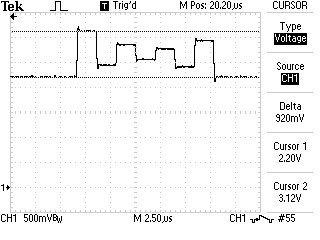
- 8lumas.png (2.02 KiB) Viewed 3728 times
It looks like every color has its own luminance level except perhaps for red and blue which appear nearly identical.
Each transition causes a bit of ringing but this is reflected on a CRT display.
Re: 6560/6561 related oscilloscope and vectorscope images
Posted: Tue Jun 14, 2016 2:26 pm
by eslapion
2 character rows lower, I did the same thing with the colors in the following order: blue, red, purple, green, cyan, yellow and white.
This is a capture of scanline 66 with the same parameters as above:
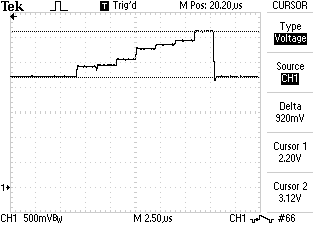
- 8lumas_increasing.png (1.93 KiB) Viewed 3728 times
Please note increasing the horizontal scale (1uS/div) results in all 8 colors not fitting in the display.
There is little difference between red and blue but we can safely say each color has its own luminance level.
Re: 6560/6561 related oscilloscope and vectorscope images
Posted: Tue Jun 14, 2016 2:41 pm
by eslapion
Here are detailed study of those colors with the cursors still set to black and white levels:
-lightest
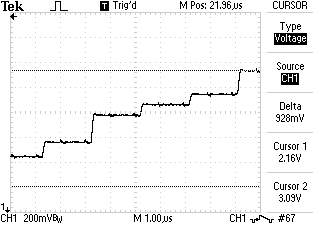
- brightestluma.png (2.03 KiB) Viewed 3728 times
-darkest
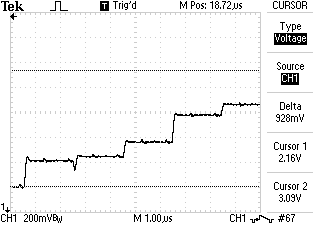
- darkestluma.png (2.07 KiB) Viewed 3728 times
Just a reminder; what you see here is blue, red, purple, green, cyan, yellow and white with a black border and background.
Having the S-Video mod is a tremendous advantage here. The chroma incorporated in composite would make it extremely difficult to have a good read on the luminance.
Re: 6560/6561 related oscilloscope and vectorscope images
Posted: Tue Jun 14, 2016 4:42 pm
by lance.ewing
eslapion wrote:I will capture a luma only signal of scanline 55 with the following configuration:
Black border then one RVS space of white, red, cyan, purple, green, blue and yellow. I don't know of any way to have all 16 colors side by side since colors 8 to 15 are only available as background colors.
Ah, yes, you're right of course regarding coloured spaces and the top 8 colours. We can do it in multi colour mode though, but that would require a bit more POKE-ing to setup, and we'd only get 2 at a time.
Re: 6560/6561 related oscilloscope and vectorscope images
Posted: Tue Jun 14, 2016 4:53 pm
by lance.ewing
eslapion wrote:Just a reminder; what you see here is blue, red, purple, green, cyan, yellow and white with a black border and background.
These images are really interesting. I suspected from the die shot that each colour must have its own luminance level, otherwise why would they each use a different pull down resistor? (and most of those resistors look quite different)
Orange is the one colour we're missing at the moment.
Re: 6560/6561 related oscilloscope and vectorscope images
Posted: Tue Jun 14, 2016 6:22 pm
by eslapion
Interesting note: having the complete background in orange introduces a negative DC offset in the luma.
I had to fill the screen with black spaces to get back to the same DC level.
Here are purple, green, cyan, yellow, white and orange:
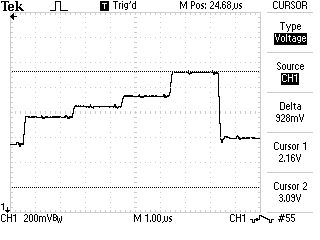
- lumawithorange.png (2.03 KiB) Viewed 3728 times
Both horizontal cursors are the same as before, cursor 1 is the black level, cursor 2 is the white level.
Is there anything else I can do for you ?
Re: 6560/6561 related oscilloscope and vectorscope images
Posted: Wed Jun 15, 2016 1:46 am
by lance.ewing
It would be great to see the other 7 colours not yet seen, i.e. the lighter shade of each. You could use the same background colour approach that you used in your most recent post above. It would be interesting if in each case the darker shade of the colour were included beside it for comparison (although I realise you can't do that for orange).
Re: 6560/6561 related oscilloscope and vectorscope images
Posted: Wed Jun 15, 2016 3:27 am
by eslapion
lance.ewing wrote:It would be great to see the other 7 colours not yet seen, i.e. the lighter shade of each. You could use the same background colour approach that you used in your most recent post above. It would be interesting if in each case the darker shade of the colour were included beside it for comparison (although I realise you can't do that for orange).
Making 7 scope captures for the remaining colors is quite a lot of trouble.
Also, the experience of changing the screen background color has shown me the DC level of the luminance signal is not fixed.
For this reason, let's say the black to white signal amplitude is 928mV and the orange luminance value is black + 400mV.
What is needed here is the luminance value for all 7 missing colors above the black level.
I can just look at the scope's screen and provide them to you as numbers instead.
Please hold on...
Re: 6560/6561 related oscilloscope and vectorscope images
Posted: Wed Jun 15, 2016 3:58 am
by eslapion
Here is the electrical value for the luminance of the following colors relative to black level:
Light orange is +670mV
Pink is +600mV
Light cyan is +800mV
Light purple +670mV
Light green is +760mV
Light blue is +540mV - CORRECTED!
Light yellow is +880mV
Re: 6560/6561 related oscilloscope and vectorscope images
Posted: Wed Jun 15, 2016 5:56 am
by eslapion
groepaz wrote:luma for white would be interesting too, then we can scale the numbers accordingly and compare with eg what VICE currently uses (see
here, VICE uses 0-256 scale)
Remember how you teased and insulted me on Lemon64 when there was stuff I didn't understand about 6502 ML ?
No, I won't do the same...
The luma for white is clearly in the last scope capture. I said I aligned the cursors to black and white levels and you can clearly see cursor 2 touch the highest level of 928mV above black.
I even specified it...
Here are purple, green, cyan, yellow, white and orange:
It was also present in this capture in post #6:
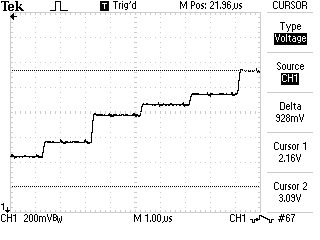
- brightestluma.png (2.03 KiB) Viewed 3728 times
It shows the luminance levels for red, purple, green, cyan, yellow and white
If you translate to a 8 bit scale the levels from the scope you get the following values: (that's 0 to 255... not 256)
Black - 0
White - 255
Red - 66
Cyan - 188
Purple - 99
Green - 160
Blue - 55
Yellow - 207
Orange - 110
Light orange - 185
Pink - 166
Light cyan - 221
Light purple - 185
Light green - 210
Light blue - 149 - CORRECTED!
Light yellow - 243